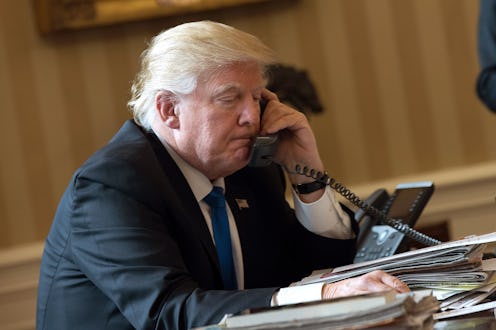News
Trump Isn't Keen On This Australia-U.S. Deal

It looks like there will be no usual "g'day, mate" for America's Australian allies from President Donald Trump. According to a report from The Washington Post, Trump's relationship with Australia's Prime Minister Malcolm Turnbull got off to a rocky start following their first phone call together on Saturday.
What was supposed to be a smooth conversation between the president and prime minister ended on a reportedly tense note after just 25-minute of speaking (The Washington Post indicates that the talk was originally slated for a full hour, but Trump supposedly ended the call early).
So, what was on President Trump's agenda with the prime minister? Apparently, they spoke about a refugee deal between the two nations that was established under Obama. Senior U.S. officials briefed on the call indicated that Trump seemed regretful of the agreement to accept 1,250 refugees who had tried to enter Australia but were housed in detention facilities on Papua New Guinea. If Trump honors the deal, it would be an exception to his temporary immigration ban.
White House Press Secretary Sean Spicer said on Tuesday that the Trump administration would go through with the deal. And Turnbull himself said the same thing during a Thursday press briefing, though he refused to comment on the details of the conversation. However, Trump's tweet following his phone conversation with Turnbull says otherwise. He even went as far as to call it a "dumb deal" on Wednesday evening, adding that he would try to "study" it.
The phone call with the Australian prime minister sets what will likely be a precedent for Trump's regular dealings with foreign leaders.
Officials reported that Trump also had a recent phone conversation with Mexican President Enrique Peña Nieto, whom he has spent months chastising over the construction of his proposed border wall. Transcripts of the call between Trump and Nieto suggest that Trump threatened to send U.S. troops to Mexico to "stop bad hombres down there" if Mexican officials did not amp up their enforcement tactics. There was no indication of just whom Trump considered "bad hombres." And Mexico insisted that contrary to the AP report on the discussion, nothing negative occurred during the phone conversation.
Though these calls paint a picture of what the new administration's interactions with foreign leaders will be like, they don't signal great hope of change between Trump the reality television star, Trump the candidate, and Trump the president. Maybe more phone calls will separate the three further.